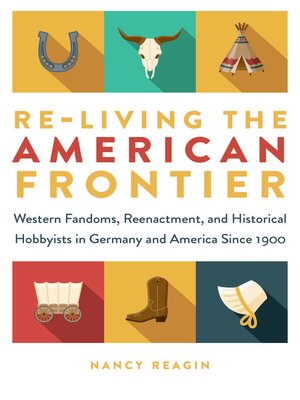Re-living the American Frontier
ebook ∣ Western Fandoms, Reenactment, and Historical Hobbyists in Germany and America Since 1900 · Fandom & Culture
By Nancy Reagin

Sign up to save your library
With an OverDrive account, you can save your favorite libraries for at-a-glance information about availability. Find out more about OverDrive accounts.
Find this title in Libby, the library reading app by OverDrive.



Search for a digital library with this title
Title found at these libraries:
| Library Name | Distance |
|---|---|
| Loading... |
The historic and mythic elements of the American Old West—covered wagon trains, herds of buffalo, teepee villages, Indigenous warriors on horseback, cowboys on open ranges, and white settlers "taming" a wilderness with their plows and log cabins—have exerted a global fascination for more than 200 years and became the foundation for fan communities who have endured for generations. This book examines some of those communities, particularly German fans inspired by the authors of Westerns such as Karl May, and American enthusiasts of Laura Ingalls Wilder's Little House on the Prairie series.
But the Old West (like all visions of the past) proved to be shifting cultural terrain. In both Germany and the U. S., Western narratives of white settlement were once seen as "apolitical" and were widely accepted by white people. But during the Nazi period in Germany and in East Germany after 1945, the American West was reevaluated and politically repurposed. Then, during the late twentieth century, understandings of the West changed in the U. S. as well, while the violence of white settler colonialism and the displacement of Indigenous peoples became a flashpoint in the culture wars between right and left. Reagin shows that the past that fans seek to recreate is shaped by the changing present, as each new generation adapts and relives their own West.
But the Old West (like all visions of the past) proved to be shifting cultural terrain. In both Germany and the U. S., Western narratives of white settlement were once seen as "apolitical" and were widely accepted by white people. But during the Nazi period in Germany and in East Germany after 1945, the American West was reevaluated and politically repurposed. Then, during the late twentieth century, understandings of the West changed in the U. S. as well, while the violence of white settler colonialism and the displacement of Indigenous peoples became a flashpoint in the culture wars between right and left. Reagin shows that the past that fans seek to recreate is shaped by the changing present, as each new generation adapts and relives their own West.







